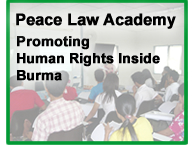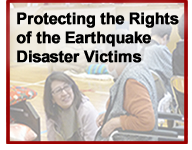International human rights should be taken into consideration when making
measures to cope with victims and refugees of the tsunami east the Great
East Japan Earthquake (original article appeared in Shinano-Mainichi
Newspaper on May 23rd 2011)
On May 23th, an article by Kazuko Ito, Secretary General of Human Rights
Now, appeared in Shinano-Mainichi Newspaper.
Proposal
measures to cope with victims and refugees of the tsunami east the Great
East Japan Earthquake (original article appeared in Shinano-Mainichi
Newspaper on May 23rd 2011)
On May 23th, an article by Kazuko Ito, Secretary General of Human Rights
Now, appeared in Shinano-Mainichi Newspaper.
Proposal
about three weeks, I have been visiting damaged areas and listening to
victims about their situation. The disparity between shelters has grown, and
in some shelters, refugees are forced to eat food with low nutritional value
as well as cold foods. Many live in a narrow rooms without privacy. Their
fatigue and stress is becoming more and more serious. The government has to
guarantee "the right to maintain the minimum standards of wholesome and
cultured living" (the Article 25 of Japanese Constitution). Therefore, they
must do something about this situation.
The situation of vulnerable groups, including children, women, handicapped
people, foreigners and old people are also areas of concern. In one case, it
is unclear whether the government has supported and cared for roughly one
hundred and forty children who have lost their parents. Women who live in
shelters have basic needs including partitions to protect their privacy,
dressing rooms, nursing rooms for women, clean bathroom. Cabinet Office have
published a notice in that shelters should prepare these facilities. But
many shelters do not have even partitions and women are reportedly
discouraged strongly from complaining.
I also listened to the handicapped people's stories. Some of them had to
leave the shelter because they were treated in a unfair manner, and some of
them could not go to shelters because they would be treated as burdens there
and discouraged from entering. How many handicapped people live in difficult
situations in areas where there are not enough shelters for handicapped
people and infrastructures have not been restored?The international
guideline for protection of victims clearly articulates that vulnerable
group in the disaster need to be cared for specially, but in this case, this
has not been fulfilled.
After the Great Hanshin Earthquake happened, there were many the
earthquake-related deaths, for example, old people had died alone in
temporary housing. Human rights problems were not solved. We must not repeat
the same mistake, human rights should be considered in the process of
rescue, restoration and reconstruction. It is necessary to guarantee rights
for people who have suffered severely and have trouble in expressing their
opinions to talk about their demands.







